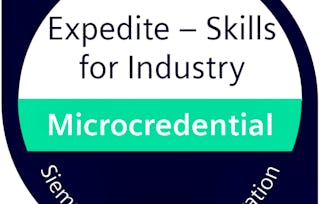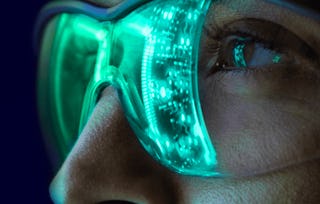Design and Manufacturing is the third course in the Siemens Expedite - Skills for Industry microcredential. In this course, the newly hired engineer will explore design and manufacturing through Product Lifecycle Management (PLM). Learn how companies manage data, integrate systems, and leverage Industry 4.0 technologies like digital twins, AI, and IoT. The course covers key aspects of product development—design validation, iterative optimization, and change management—while also focusing on project planning, risk management, and sustainability. Gain a broad understanding of how PLM shapes modern engineering and manufacturing.

Expedite – Skills for Industry: Design and Manufacturing
Seize the savings! Get 40% off 3 months of Coursera Plus and full access to thousands of courses.

Expedite – Skills for Industry: Design and Manufacturing
This course is part of Expedite – Skills for Industry Microcredential Specialization

Instructor: Siemens Digital Industries Software
Included with
Recommended experience
What you'll learn
Evaluate the impact of advanced PLM strategies and emerging trends on modern manufacturing practices.
Explore product development solutions related to managing BOM, design validation, iterative optimization, and change management in a PLM framework.
Assess the impact of PLM tools in addressing challenges at various product lifecycle stages and in enhancing collaboration and data integration.
Skills you'll gain
- Internet Of Things
- Sustainable Design
- Project Planning
- Product Lifecycle Management
- Artificial Intelligence
- Manufacturing and Production
- Design and Product
- Cross-Functional Collaboration
- Time Management
- Risk Management
- Engineering
- Product Development
- Product Design
- Artificial Intelligence and Machine Learning (AI/ML)
- Communication
- Conceptual Design
- Sustainable Engineering
- Systems Engineering
- Product Management
Tools you'll learn
Details to know

Add to your LinkedIn profile
13 assignments
See how employees at top companies are mastering in-demand skills

Build your subject-matter expertise
- Learn new concepts from industry experts
- Gain a foundational understanding of a subject or tool
- Develop job-relevant skills with hands-on projects
- Earn a shareable career certificate

There are 7 modules in this course
Welcome to Design and Manufacturing, the third course in the Siemens Expedite - Skills for Industry microcredential, exploring the strategies, tools, and technologies shaping modern product development. You will start with the principles of Product Lifecycle Management (PLM), understanding the role of Industry 4.0 technologies in driving digital transformation. The course highlights structured workflows, collaboration, and data-driven decision-making through PLM. You'll learn how early-stage ideation and conceptual design ensure products meet functional, economic, and sustainability goals. Key topics include system integration, product optimization, and the impact of connected technologies in modern manufacturing. You will examine the product lifecycle stages and leverage PLM tools, digital threads, and smart manufacturing to address challenges such as design coordination, documentation management, and quality control. The course also covers risk management strategies and project planning methodologies for successful execution across the development cycle. Additionally, you'll explore advanced technologies, including digital twins, AI in design, and green manufacturing. By the end, you'll have the skills to drive innovation, efficiency, and sustainability in the evolving engineering landscape.
What's included
2 videos3 readings2 assignments3 plugins
Data management is the backbone of PLM, influencing every aspect of the system. You will explore methods for capturing, storing, and managing data to support informed decision-making throughout the product lifecycle. Additionally, you will discover how PLM fosters collaboration among cross-functional teams and integrates digital twins to enhance performance and coordination during development.
What's included
1 reading2 assignments3 plugins
To effectively plan a project, you need to account for various resources, time, and potential issues that may arise. You will discover how PLM tools help to optimize resource allocation and scheduling, enabling proactive risk management throughout the product lifecycle. You will learn how to identify project requirements and scopes, develop efficient schedules, and tackle risk management challenges through real-life scenarios, crafting strategies that anticipate future needs.
What's included
1 video1 reading2 assignments5 plugins
This is your opportunity to think creatively and contribute fresh ideas to the design process as you learn about digital prototyping and incorporating market trends and user feedback. You’ll collaborate with the team to refine product concepts using real-time feedback and insights. You will also discover how cutting-edge technologies like AI enhance design workflows, ensuring innovative and user-centered outcomes.
What's included
1 video1 reading2 assignments2 plugins
Dive deeper into the core aspects of product development by refining processes for efficiency and innovation within PLM systems. You will concentrate on managing Bills of Materials (BOM) and harnessing the transformative power of the Internet of Things (IoT). Examine different types of BOMs and learn how to use IoT data to gain “real-time” insights, which are important for optimizing product development.
What's included
1 video2 assignments4 plugins
With a focus on the future, you will apply eco-friendly principles throughout the product lifecycle. You will collaborate with the team to develop sustainable designs, select eco-friendly materials, implement green manufacturing practices, and devise effective end-of-life strategies. You'll also engage in a discussion aimed at producing an environmentally responsible product from conception to disposal, paving the way for a sustainable future in manufacturing.
What's included
1 video2 assignments3 plugins
Can you believe you've been at NGenius Engineering for this long? Six months! It is time for you to participate in your second performance review. This review assesses your understanding of key concepts from the course, including Product Lifecycle Management (PLM), data management, and Industry 4.0 technologies. It is an opportunity to reflect on your progress, demonstrate your understanding of design and manufacturing principles, and identify areas for continued growth.
What's included
1 video1 assignment
Earn a career certificate
Add this credential to your LinkedIn profile, resume, or CV. Share it on social media and in your performance review.
Instructor

Offered by
Explore more from Mechanical Engineering
 Status: Free Trial
Status: Free Trial Status: Free Trial
Status: Free Trial Status: Free Trial
Status: Free Trial Status: Free Trial
Status: Free Trial
Why people choose Coursera for their career

Felipe M.

Jennifer J.

Larry W.

Chaitanya A.

Open new doors with Coursera Plus
Unlimited access to 10,000+ world-class courses, hands-on projects, and job-ready certificate programs - all included in your subscription
Advance your career with an online degree
Earn a degree from world-class universities - 100% online
Join over 3,400 global companies that choose Coursera for Business
Upskill your employees to excel in the digital economy
Frequently asked questions
ABET is the global accreditor for engineering and technology programs. When a course is part of an ABET-recognized curriculum, it means the content aligns with rigorous industry and educational standards used by top universities and employers worldwide. As a learner, this signals that the course covers skills, concepts, and competencies that meet global expectations for quality, relevance, and technical accuracy.
ABET recognition provides tangible value as you learn and advance your career. It ensures the course material is trusted by employers, aligned to real-world engineering and technology practices, and designed to support outcomes such as problem-solving, technical proficiency, and applied learning. Learners who complete ABET-recognized content can gain a ‘ABET Program Graduate Badge’ showcasing:
- Stronger credibility with employers and engineering teams, globally.
- Learning pathways aligned to global engineering standards
- Better preparation for technical roles, advanced study, or certification routes
- Confidence that the training meets internationally vetted quality benchmarks
To access the course materials, assignments and to earn a Certificate, you will need to purchase the Certificate experience when you enroll in a course. You can try a Free Trial instead, or apply for Financial Aid. The course may offer 'Full Course, No Certificate' instead. This option lets you see all course materials, submit required assessments, and get a final grade. This also means that you will not be able to purchase a Certificate experience.
More questions
Financial aid available,

